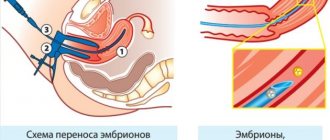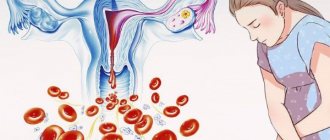The reproductive system is a rather complex mechanism. Sometimes it is very difficult to notice symptoms that require treatment in a timely manner. In addition, not all women take responsibility for their own health, which leads to dire consequences. All representatives of the fair sex who have reached the age of 16 must visit a gynecologist at least once a year.
One of the most common pathologies is that menstruation does not end. It is worth sounding the alarm if they last more than 10-14 days. Normally, menstruation lasts about a week. Otherwise, it is no longer just discharge, and we can talk about bleeding.
Menstrual cycle and menopause
The menstrual cycle in women of reproductive age occurs in several main stages:
- egg maturation;
- release of the fertilized egg from the follicle (ovulation);
- endometrial proliferation;
- death of the egg and rejection of the endometrium in the absence of fertilization. During this period, the arrival of menstrual flow is noted.
All these processes are regulated by the hormones estrogen and progesterone in women at puberty. Such changes are observed monthly. The duration of the cycle can vary from 21 to 35 days.
Over time, reproductive function begins to fade. This process is caused by hormonal changes and the gradual cessation of the production of sex hormones. This period is called menopause. As a result of such changes in the body, menstruation ends and menopause occurs.
What is artificial menopause
There are cases when menopause is induced artificially. This may be due to surgery to remove the ovaries. And also because of chemotherapy and radiation therapy, which destroy the functioning of the reproductive organs. Typically, such measures are used in the case of serious cancer, which can only be cured in such a radical way. After the manipulations, the female body no longer produces the required level of sex hormones and all the symptoms of menopause can be observed.
Artificial menopause can be caused by another operation - removal of the uterus. Although the ovaries remain, menstruation will stop completely. The characteristic signs of menopause in this case are observed later. The period is comparable to the time of natural menopause.
The female body is a balanced mechanism, the work of which is ensured by the functioning of many organs. As they age, many of them lose their abilities and go through stages of dramatic changes. The performance of the reproductive system especially changes. After 45 years, menopause occurs, when women's menstrual cycle ends forever, and then it is no longer possible to get pregnant.
Many women begin to worry, a bad mood appears, problems with sleep and indifference to everything that happens. Most representatives of the fair sex anticipate menopause with caution and perceive its name negatively. But you should perceive this period as a new stage of life with other, new opportunities. Everything is not so bad, because after menopause ends, all processes in the body stabilize and return to normal. You can always seek help from specialists who will help you overcome difficulties and help you live life to the fullest.
When to expect menopause
At a certain stage in women's lives, the process of biological aging begins. It is characterized by a decrease in reproductive function, hormonal changes and the impossibility of fertilization. Such changes occur over several years and are called menopause. It occurs in several stages:
- Premenopause. This condition is observed at the age of 40–45 years. In this case, the functions of the ovaries are gradually suppressed. These paired organs are responsible for the production of estrogen, which is necessary for the maturation of the fertilized egg. The concentration of the hormone gradually decreases, after which its production stops. The duration of perimenopause varies from 2 to 10 years.
- Menopause. This period begins a year after the cessation of menstrual flow.
- Postmenopause. The appendages stop functioning as they should, estrogen is not produced, and the number of genetically stored eggs runs out.
As a rule, critical days during menopause stop at the age of 49–52 years. A woman reaches menopause after a year. However, not a single doctor can name the exact age at which menopause will begin. This process is influenced by many factors, including heredity, health status, bad habits and lifestyle.
Biological aging can begin earlier or later than expected. Often, the decline of reproductive function at the age of 50–60 years is observed in the presence of malignant tumors.
What can affect the end of menstruation ahead of time?
- Oncological diseases and radiation therapy or genital surgery performed at this time.
- Postponed surgeries.
- Heredity.
- Thyroid disease.
- Nervous overstrain.
- State of the ecological system in the region of residence.
- Hard labour.
Menopause can also occur faster due to sleep disturbances, problems with sex life and pathological pregnancy.
Symptoms of menopause
The first symptoms of menopause begin to appear long before the complete cessation of menstrual flow. Therefore, it is so important for women to understand what changes are occurring in their body.
The following clinical manifestations are noted:
- cycle failure. Critical days become irregular, prolonged, the nature of discharge and the volume of blood lost changes. This period lasts about a year, after which the regulations are no longer observed;
- tides. In this condition, a feeling of heat appears, changes in body temperature, excessive sweating, and pressure changes are observed, which are accompanied by disturbances in heart rhythm. Such sensations are observed for 5–15 minutes, after which they disappear as suddenly as they appeared;
- dryness in the genital area. In this case, a woman may experience pain during intimacy. Itching and burning may also occur;
- disorders of the urinary system. Menopause is often accompanied by inflammatory processes in the urinary tract and bladder. Problems during urination cannot be ruled out;
- change in psycho-emotional state. Symptoms such as irritability, nervousness, depression, sleep disturbances, memory problems and frequent headaches are noted;
- lack of sexual desire;
- laxity of the skin and hair loss;
- increase in body weight.
Periods and sex
Gynecologists do not recommend intimacy during menstruation, even if you plan to use condoms to protect against possible infection. During sex, the free outflow of bloody discharge is disrupted - this can cause the formation of blood clots that will not leave the uterine cavity and will give rise to the development of endometriosis.
In addition, the mucous membranes of the genital organs are swollen and hypersensitive during menstruation - intimacy can cause discomfort to the woman, and touching the penis to the swollen cervix causes pain.
To avoid the risk of infection, blood reflux and pain, you should wait until the bleeding stops with intimacy.
Tags:
women Health
Heart rhythm disturbance
The period when menstruation ends is not considered menopause. After their complete cessation, another whole year must pass before such a diagnosis is made. Clinical manifestations at this point are even more pronounced. This is due to a lack of sex hormones and the end of the functioning of the appendages. Then irreversible processes begin, indicating the actual aging of the female body.
What should you not do during your period?
Menstruation is not a disease. On the contrary, this is a sign that the girl’s health is fine and she can give birth and carry a child if she wishes. However, this does not mean that you do not need to take care of your health at this time.
During menstruation, it is very important to observe a number of restrictions so as not to harm your body and not increase bleeding.
Experience physical activity
On critical days, it is highly advisable to limit physical activity, and this applies to even the most notorious sports fans. Do not lift weights, run, or do strenuous physical work.
Why? Because all these actions increase blood flow to the pelvic organs and aggravate bleeding from the vagina. Because of this, the hemoglobin level may drop significantly, causing a feeling of weakness, drowsiness, and fatigue.
By the way, this is why many schools allow you not to go to physical education class when girls are menstruating.
Drink alcoholic drinks
Alcohol is harmful in itself, so you should avoid it on other days as well. But during menstruation, alcohol is also prohibited because under its influence the walls of blood vessels dilate, which again can lead to more heavy bleeding.
Have a sex life
Lovers should wait a few days to protect the body from pathogenic organisms. During menstruation, the uterine and vaginal mucosa becomes very vulnerable, and the risk of contracting an infection increases several times.
In addition, sex is also physical activity, which is contraindicated during this period. And there may not be any pleasure, since it will be difficult for a woman to relax due to the discharge and special smell.
Take a hot bath, go to the sauna, swim in open water
During menstruation, girls need to take better care of themselves and regularly wash themselves with warm water to avoid the appearance of an unpleasant odor. You should not take a hot bath, much less visit a sauna. There are cases when, after such visits, women began bleeding so heavily that it was difficult to stop.
Also, during menstrual bleeding, you should not swim in pools and especially open water, as the risk of pathogenic bacteria entering the vagina and uterus increases. Unfortunately, even the use of tampons will not help provide the necessary protection.
Plan operations
Doctors warn that during menstruation it is impossible to plan operations, even such seemingly insignificant ones as tooth extraction, since during these days women’s blood clotting worsens.
Ignoring this prohibition can lead to complications: large-scale, difficult-to-stop bleeding and large blood losses.
Take anticoagulants
For the same reasons, during the period when menstruation occurs, you should not take aspirin, ascorbic acid and other anticoagulants. They thin the blood and prevent it from clotting, so they can cause heavy bleeding.
Follow a strict diet
On the days of menstruation, you should not adhere to strict dietary restrictions, much less starve or sit on liquid or mono diets. The girl must eat well so that the body is not depleted due to simultaneous blood loss and malnutrition.
The result of dieting during menstruation can be a serious deterioration in health and fainting.
If a girl takes care of herself, eats right and does not overwork, then her critical days will pass without any negative consequences.
How to determine the last day of menstruation
Determining the last day of your period is quite simple. Towards the end of menstruation, blood comes out in significantly smaller quantities, after which it completely disappears . In this case, minor spotting can be observed for another 1–2 days. She indicates that the critical days will soon end. A woman will know about their completion by the release of white discharge without any shade.
A regular menstrual cycle is the main indicator of women's health. Any changes in it cause anxiety among the fair sex. For this reason, it is so important for them to understand exactly what is happening in the body. Particular attention is paid to the period of menopause and the onset of menopause. Such age-related manifestations significantly affect general well-being and indicate biological aging of the body. If you determine the beginning of this period in a timely manner, it will be possible to alleviate the unpleasant symptoms to some extent and make it easier to endure such a difficult stage of life.
How to relieve menopause
There are several ways to eliminate or alleviate the condition of women when their periods end irrevocably:
- Treatment with hormones . During menopause, a woman's levels of progesterone and estrogen sharply decrease, which leads to health problems (osteoporosis, vascular blockage, stroke, etc.). By taking hormones, progesterone and estrogen are balanced. As a result, hot flashes and sweating decrease, insomnia disappears, and the woman’s general condition improves significantly. But recently it was discovered that when treated with hormones, the risk of cancer increases sharply. Therefore, it is recommended to look for other ways to treat menopause.
- Dietary supplements or phytohormones . They also replenish the body with essential estrogen. True, there are contraindications: tumors and people whose metabolism is slow, because the drugs cause excess weight.
- Homeopathy . Such remedies are very successfully used for a long time and successfully relieve the signs of menopause. But that’s not all, you need to reconsider your lifestyle and adjust some nuances that will help you get through this difficult period with ease:
- Make morning exercise your friend. A little warm-up, swinging your arms and legs will improve your well-being, lift your spirits and relieve headaches.
- to walk outdoors every day , especially before bed. This will help you understand your inner feelings and work up an appetite for the night. You can include your relatives in the walks, and this will further strengthen the family.
- Don't forget to pamper yourself with your favorite active activities . For example, dancing, yoga, fitness, sports. These methods will perfectly help you relax and satisfy your mental and physical well-being.
- Give up bad habits as much as possible . Drink less alcohol, eat right, quit smoking, drink more clean water. All this is a guarantee of health.
- It is important not to indulge in poor health with sweets and carbohydrates. Extra pounds don't make anyone look better, and you won't be healthier from what you eat.
- Try to sleep at least 8 hours a day . Healthy sleep is the key to a good mood.
- Avoid stressful situations , be less nervous and believe only in the good, because it has long been known that thoughts are material. And with an integrated approach to menopause, you can avoid many negative factors, improve your condition as much as possible, and you won’t notice how menopause ends.
Sources:
https://topginekolog.ru/menstruation/o-mesyachnyh/kak-ponyat-chto-zakonchilis https://mesyachnyedni.ru/menstruaciya/kogda-zakanchivayutsya.html https://livewomen.ru/kogda-mesyachnye-zakanchivayutsya- navsegda/
What is the menstrual cycle?
A woman's menstrual cycle is on average 28 days. Menstruation can begin 21-35 days after the last menstruation, which will not be considered a pathology or deviation from the norm. Calculating the cycle is simple: from the first day of menstrual bleeding, ending with the first day of discharge in the next month. To understand when the critical days will begin, you need to understand the internal processes that occur every month in the girl’s body.
Gynecologists usually divide the menstrual period into four phases. Let's consider each stage separately:
- First phase. Lasts on average 5 – 7 days from the start of bleeding. At this time, the concentration of progesterone (the female sex hormone responsible for pregnancy) decreases. If conception does not occur, the process of epithelial detachment in the uterus begins. When the epithelium separates, the vessels burst, which causes pain in the lower abdomen. At the same time, the hypothalamus (the part of the brain that regulates the release of hormones in the body) gives the command to prepare a new egg. The production of another female hormone, estrogen, necessary for the next stage, will immediately begin.
- Second phase (from 5 to 14 days). Your period ends, but mucus continues for a few more days. These two to three days are the lowest chance of getting pregnant. From the 10th day of the cycle, the concentration of estrogen increases rapidly. Under the influence of this hormone, the follicle in the ovary ruptures and a mature egg is released. Now the time has come for possible conception. The rupture of the follicle wall itself can be felt by a woman with mild pain in the iliac region.
- Third phase (from 15 to 23 days). The egg moves slowly through the fallopian tubes, awaiting fertilization. If conception does not occur, the concentration of estrogen gradually decreases. The remains of the follicle turn into the corpus luteum - the source of the hormone progesterone. He, in turn, starts the processes of the last phase of the reproductive cycle.
- Fourth phase (from 23 to 28 days). It is during these days that the girl feels discomfort and pain. At the last stage, progesterone promotes the rejection of the epithelium from the inner walls of the uterus, which comes out in the form of dark clots from the vagina. With the onset of discharge, a new menstrual period begins.
In the last 7 days of the cycle, the woman’s genitals are tense and painful, and the mammary glands swell under the influence of progesterone. All these are clear signs that critical days will begin soon.
What is menstruation
Many call “women’s days” critical, but first it is important to find out how menstruation occurs. Menstruation is regulated by various hormones. There are four of them.
Two of them, follicle-stimulating hormone (FSH) and luteinizing hormone (LH), are produced by the pituitary gland, located at the base of the brain. The ovaries, located in the pelvic area, are most responsible for the production of two other hormones - estrogen and progesterone.
Under the influence of FSH and LH, the ovaries are stimulated to produce estrogen and progesterone. Estrogen causes the inner lining of the uterus (endometrium) to thicken, and progesterone causes its final “ripening”. If the egg is not fertilized, the levels of estrogen and progesterone drop.
The decrease in hormones causes the endometrium to shed and is released into the blood through the vagina. This is menstruation, which usually lasts from 2 to 7 days.
Causes of heavy periods
As we have already found out, the duration of menstruation is not a constant value, it is different for each woman. But there are several reasons for prolonged and heavy bleeding:
- age (at risk are women approaching menopause and young girls in the first year of menstruation);
- bleeding disorders (for example, with immune thrombocytopenia and hereditary von Willebrand disease);
- hormonal imbalance, which leads to excessive thickening of the endometrium and, ultimately, heavier bleeding;
- the first months after childbirth;
- infections of the reproductive organs or urinary tract;
- high insulin levels;
- uterine fibroids or endometrial polyps;
- adenomyosis;
- taking steroid and chemotherapy drugs, as well as anticoagulants, for example, Warfarin;
- the presence of an intrauterine device;
- renal or liver failure;
- cancer of the uterus;
- some herbal supplements (ginseng, ginko, soy).
The most common complication of heavy periods is iron deficiency anemia. However, when the bleeding is really heavy and persistent, it can lead to unpleasant symptoms such as palpitations and shortness of breath.
How can you tell if you have menorrhagia?
Bleeding during menstruation is experienced differently each time, but gynecologists recommend not to ignore such signs of menorrhagia as:
- frequent change of pads or tampons - every 1-2 hours for 1 day;
- large blood clots (more than 2.5 cm in size);
- severe weakness and malaise:
- blood leaking onto clothes and underwear, despite all means of protection.
One way to measure the amount of blood loss is to use a menstrual cup. This is a special device that holds 24 ml of liquid (3 times more than a super tampon). A regular pad can absorb up to 5 ml of menstrual blood.
If heavy periods greatly interfere with your daily life, preventing you from working, studying, or participating in various activities, consult your doctor. The gynecologist will start by asking you about any changes in your periods and any other symptoms (bleeding between periods or pain during your period). After a physical examination, the doctor may refer the patient to:
- ultrasound scanning;
- blood analysis;
- hysteroscopy to examine the inner lining of the uterus.
What is the difference between heavy periods and bleeding?
It is important not to confuse very intense periods with uterine bleeding, in which you should not hesitate, but should immediately call an ambulance. How to recognize signs of abnormal bleeding? Let's list them:
- Bleeding occurred earlier than the usual period, after sex or during pregnancy.
- Scarlet blood.
- Weak or rapid pulse;
- Paleness, severe dizziness, nausea.
- The discharge does not stop, but increases.
- Increased sweating.
- Injury to the pelvic organs.
It is also necessary to differentiate vaginal bleeding from bleeding from the urinary tract or rectum. In addition, for pregnant women, vaginal menstrual-like bleeding may be a sign of a threatened miscarriage or ectopic pregnancy.
Before the ambulance arrives, use these simple tips:
- drink more fluids;
- lie down and raise your legs on a pillow or bolster;
- Apply an ice pack wrapped in a towel to your lower abdomen for 10 minutes.
Various Treatment Options
After examination, to regulate and ease the menstrual period, the doctor may prescribe hormonal or anti-inflammatory therapy, endometrial removal, myectomy (surgery to remove fibroids), uterine artery embolization (procedure to shrink uterine fibroids) or hysterectomy (surgery to remove the uterus).
This or that treatment option is selected by the doctor individually based on the risks, as well as depending on the symptoms, the general health of the patient, and future pregnancy planning.
- We hope that our article will allow you to see the difference between heavy periods and bleeding and understand that in both cases a thorough medical examination and correct diagnosis are required.
- Related Posts
- leave a comment
The main symptoms of approaching menstruation
There are a number of harbingers by which any girl will understand that her period will soon begin. Each organism will have them individually, with varying degrees of severity. Therefore, it is worth monitoring which signs appear more clearly and which are mild or unnoticeable. It is also important to understand what specific day they occur. This way you can calculate your individual menstrual schedule literally down to the day or even the hour.
So, how do you know when your period is about to start? Main symptoms:
- Enlargement and engorgement of the mammary glands. Nagging pain, itching and tingling in the chest. There may be clear discharge from the nipples, which later curdles. The reaction of the glands to hormonal changes is different for each girl. The soreness should resemble the first sensations of breast growth in adolescence. Therefore, if you experience severe or acute pain in the chest, you should consult a gynecologist to prevent dangerous diseases.
- There is a nagging pain in the lower abdomen, radiating to the lower back. Swelling of the abdomen. This occurs because a layer of epithelium in the uterus breaks away. Acute painful sensations can occur in the last three days before menstruation, but it all depends on the characteristics of the body and the pain threshold of the woman. Some feel no pain at all, and note a slight stretching and discomfort in the lower abdomen.
- Rash on face. It occurs mainly in adolescence, but also occurs in adult women with oily skin. This reaction is caused by a change in hormonal levels in the second half of the cycle.
- Intestinal disorder. When the endometrium is separated, the uterus swells, puts pressure on the intestinal walls and this contributes to more frequent bowel movements. The general metabolic process also affects during this difficult period. The body experiences stress and tries to get rid of everything unnecessary.
- Psychological discomfort, irritability. This difficult condition is called premenstrual syndrome (PMS). It does not occur in every girl, but only in 5% of the fair sex. It manifests itself in the form of nervousness, sudden mood swings, tearfulness, headaches, dizziness and general weakness in the body.
Non-pathological causes of one-day menstruation
A one-day smear instead of a full period may occur due to pregnancy. As a rule, pregnant women do not have menstruation. But sometimes it happens that at the moment of implantation of the embryo, the wall of the uterus rejects reddish mucus. If a woman does not know for sure whether conception has occurred, it is better for her to take a pregnancy test and not wait until the next month to check her cycle.
Whether menstruation can last for 1 day is determined by the fact that there is no ovulation. Once a year, the body can take a break without showing pathological symptoms. If the pregnancy test is negative and the woman feels normal, there is no reason to worry.
You should wait until your next period and see if it is normal.
In young girls whose cycle is just becoming established, short menstruation is also not a pathology. The body learns to perform new functions. At first, he doesn’t always do this well. The cycle should stabilize within 2 years.
Heredity may also be the cause of short menstruation. If your mother, grandmothers and sisters do not bleed for several days, it means that this is a genetic feature of a particular family.
There are also external factors that shorten the duration of menstruation:
- Stress - psycho-emotional overload negatively affects the functioning of the whole organism, incl. and on the reproductive system.
- Poor nutrition - strict dietary restrictions and a lack of fortified and fatty foods can make periods short-term.
- Physical overexertion - intense sports, as well as regular hard work, undermine the stability of the cycle.
- Excess body weight - obesity disrupts the functioning of the endocrine system, distorts hormonal levels and makes menstruation a one-day mess.
- Taking antibiotics – if you had to treat a severe cold or infectious disease with antibiotics, the body may respond to therapy with hormonal imbalance.
Thus, one-day menstruation looks like a completely normal phenomenon. The examination shows the normal functioning of the female reproductive system and does not require drug treatment. Many women themselves understand why their periods were one day and do not turn to specialists with a one-time episode of spotting.
Injuries to the genitourinary system, earlier genital surgeries, bad habits, abortions and miscarriages can shorten critical days. Menstruation for 1 day is often a harbinger of menopause.
https://youtu.be/xTJMDWE7CAo
When is hypomenorrhea a cause for concern?
If your period lasts for 1 day and ends, and this happens for a long time, you should contact a gynecologist and find out the cause of the anomaly.
Short-term discharge with hypomenorrhea looks like drops or faint traces of light red or brown color. But you can’t rely only on the color of blood. It is necessary to monitor the dynamics of the decrease in cycle duration and take measures to prevent amenorrhea - the complete cessation of menstruation.
One-day periods may be a sign of the following diseases:
- Tuberculosis of the genital organs.
- Diabetes mellitus and thyroid pathologies - improper functioning of the endocrine system negatively affects the cycle.
- Neoplasms, inflammations, infectious diseases of the genital organs.
- Dysfunction and polycystic ovaries.
- Koch's bacillus in the reproductive system.
- Pathologies of the cardiovascular system, kidneys and liver - in adolescent girls, disorders affect the nature of menstruation.
- Pathologies of the pituitary gland.
- Underdevelopment of the endometrium.
An important signal in the development of pathologies is discharge after menstruation. Normally, daubing should last 1 – 2 days.
If the period of spotting is longer, interruptions periodically occur and the duration of menstruation is reduced to 1 day; what this means, the woman herself will not be able to determine. Changes indicate possible pathologies of the reproductive organs or hormonal imbalances caused by the invasion of infection.
Pathological signs of hypomenorrhea include very scanty and excessively abundant bleeding, sharp and nagging pain in the lower abdomen, and a feeling of nausea. In this case, you cannot hesitate. It is necessary to urgently contact a gynecologist and undergo an examination.
Diagnostics
The doctor will be able to figure out why the period started one day and ended based on the collected medical history. The patient should talk about the rhythm of sexual life, cases of pregnancy and abortion, and features of everyday life. After eliminating the predisposing factor, the cycle should return to normal.
If your periods are unstable and periodically last only one day, it is important to detect the pathology and carry out the correct treatment.
Diagnosis of short-term menstruation comes down to measures such as:
- Examination on a gynecological chair with taking a smear.
- Bac sowing.
- Cytology of the genital organs.
- Blood and urine analysis.
- PCR.
- Ultrasound of the uterus and ovaries.
- Scraping of the uterine wall to assess the condition of the endometrium.
When menstruation begins to occur regularly within 1 day, you need to additionally visit an endocrinologist. The specialist will diagnose thyroid diseases and develop an effective treatment regimen to improve the cycle.
Treatment options
If the cause of menstruation lasting one day is poor nutrition, the patient is prescribed a balanced diet with a predominance of vitamins. According to indications, multivitamin complexes may be prescribed.
Reproductive functions are unlikely to be restored within 1 month. You need to be patient and achieve positive results.
If it has been determined that a reduction in the duration of menstruation is associated with stress, the patient is prescribed sedatives, herbal decoctions according to traditional medicine recipes and special procedures. If this is possible, it is better to change your occupation or relax in a resort area.
An improperly functioning hormonal system is corrected with drugs containing estrogen. They stimulate ovulation and regulate the menstrual cycle. Hormonal contraceptives not only regulate the cycle, but also protect the body from pregnancy after unprotected sex. Homeopathy drugs instead of hormonal drugs are prescribed to women for mild hypomenorrhea.
Sometimes doctors replace synthetic hormones with traditional medicine. Tinctures of clover and soy contain substances similar to female sex hormones.
Doctors suggest surgical intervention for short menstruation if polycystic ovary syndrome is detected. The operation is called “spot diathermocoagulation”. Its purpose is to cauterize the affected ovarian tissue with high-frequency current. The result of treatment will be the normalization of the ovulatory process in a short time.
The operation is mandatory if menstruation lasts for 1 day due to a congenital anomaly in the structure of the genital organs. Also, the help of a surgeon is needed for complex gynecological diseases.
If the abnormal cycle is caused by an infectious-inflammatory process, the woman receives a course of antibiotics and medications to relieve inflammation. Treatment takes place at home. When the need for surgery arises, the patient is hospitalized for some time.
Menarche in a girl
The onset of the first bleeding in girls is called menarche. This is a very exciting time for teenagers. To prevent panic, mothers should tell girls the main points related to the cycle:
- why do you get your period?
- how to determine that they are coming soon;
- how to use pads;
- why keep a calendar;
- When will your next period appear?
Normally, discharge begins between the ages of 11 and 13. For overweight girls, it can come earlier - at 9 - 10 years old. This is due to the fact that in adipose tissue there is a transformation of male hormones into female ones, which affect the onset of menstrual flow. Obese girls are at risk of receiving high doses of estrogen at a fairly early age. And this, in turn, can provoke hypertension, strokes and heart attacks in the future. It happens that menstruation comes late - in the period from 14 to 16 years.
Any deviation from the norm is a serious reason to show the girl to a pediatric gynecologist.
What signals indicate that your first period will begin soon:
- Whitish discharge visible on panties.
- Enlargement of the mammary glands and nipples.
- Rash, pimples on the face, back and chest.
- Increased sweating, activation of the sweat glands.
- Hair appears on the pubis and armpits.
- The hips are rounded.
The above symptoms will appear a year or two before your first menstrual bleeding. And even if there is no menarche yet, it is worth having a conversation about the changes in the girl’s body. Tell her that she is becoming a girl and all these processes will help her become a mother in the future.
Hormones
What can a missed period tell you about, other than pregnancy? Natural changes in hormonal levels occur with the onset of menopause - the production of hormones in the ovaries ceases. They may also stop being produced if the hormonal system malfunctions at a younger age.
Especially often, women experience cycle failure due to thyroid dysfunction (excessive or insufficient activity).
Therefore, if menstruation is delayed, if a gynecological cause is excluded, the woman is most often referred to have her thyroid gland checked and her hormonal status determined. A referral for examination is issued by an endocrinologist.
How to calculate the start of your period?
Those girls whose periods come irregularly (sometimes ahead of schedule, sometimes late) are recommended to use the following methods for calculating their critical days:
Almost every woman keeps her own “red calendar”, marking the first and last day of discharge. This method has been tested for several generations, but is more suitable for girls with a regular cycle. In any case, the calendar will not let you forget when the last critical days were. When visiting a gynecologist, using a calendar, you can calculate your personal menstrual cycle, see when a malfunction occurred and identify the cause. Also, favorable days for conception and a “safe” period are calculated by dates.
A slight increase in body temperature is observed in the second half of the menstrual cycle and indicates the beginning of ovulation. To know when the egg is released, you need to measure your basal temperature daily. To do this, every morning, without getting out of bed, the temperature in the anus is measured.
In the first half of the cycle, the temperature will be 36.5 – 36.8 C°. Then it gradually decreases until ovulation. Immediately after the release of the egg, the temperature rises sharply by 0.5 - 0.6 C°, lasts for several days and gradually decreases towards the beginning of menstruation. If we understand on what day the temperature rose sharply, all that remains is to add 14 days to this date. And it turns out the expected day of the beginning of menstruation.
Important! Taking hormonal medications does not allow you to accurately measure basal temperature.
An easier way to determine the ovulatory period is to use a special test that is sold at any pharmacy. Using the same test, the day of ovulation is calculated, two weeks are added to it, and the date of future menstruation is obtained. Thanks to the test, it is easy to calculate the day favorable for visiting a gynecologist and getting tested. And, of course, the best day to conceive.
Fixing the problem
Self-medication is dangerous, as it can only worsen the existing pathology. Only a gynecologist can determine exactly why your period started and ended immediately; you may need to consult an endocrinologist. The doctor will prescribe the most effective treatment and give recommendations for preventing the occurrence of similar disorders in the future in a specific clinical case.
The main types of treatment used to normalize the cycle in such cases:
- Herbal medicine with both official complexes (for example, Cyclodinone) and individual herbs for self-brewing or infusion (red brush, boron uterus and others).
- Oral contraceptives to normalize your own hormonal levels. The average duration of such treatment is at least 3–6 months.
- Various physiotherapy procedures, acupuncture and other methods of alternative medicine (hirudotherapy, etc.)
- Sometimes it is necessary to perform curettage of the uterine cavity to diagnose or remove pathological formations, perform hysteroscopy or even laparoscopy.
We recommend reading the article about menstrual irregularities. From it you will learn about the causes of pathology, diseases that cause malfunction of the reproductive system, as well as the treatment of menstrual disorders.
Briefly about menstruation
A healthy woman's period comes every month and lasts from four to six days. Sometimes the menstrual cycle gets confused, and they begin not on the planned dates, but earlier or later than the day marked on the calendar. This is a completely normal phenomenon for unfinished puberty, pregnancy or the postpartum period - however, a cycle failure for no apparent reason requires contacting a gynecologist, who will find out the cause and help solve it.
After childbirth, menstruation is temporarily replaced by specific discharge - lochia, which disappears after two weeks.
During the period of breastfeeding, menstruation may disappear completely for some time. This is a natural process that is regulated by the body in order to prevent a new pregnancy in such a short time. In medicine, this phenomenon is called lactational amenorrhea and should not be a cause for concern.
What determines the age of menopause?
The reasons why menopause occurs at one age or another are numerous. The main factor is genetics. If a girl wants to find out approximately at what age her reproductive period may end, she needs to ask this question to her closest female relatives. To approximately determine the age of menopause, the doctor will ask the patient the same question.
Some studies confirm that bad habits (smoking and frequent drinking of alcohol) delay the onset of menopause; it can begin 2-3 years earlier than it was intended by nature. But excess weight, on the contrary, pushes this date back by about a year.
Gynecological operations, as a rule, disrupt the normal functioning of the reproductive organs. If during surgery one of the ovaries was removed, or only part of it was affected, the “bank” of eggs is reduced, so menopause occurs a little earlier. Major operations to remove the uterus and appendages also affect the early onset of menopause.
As already mentioned, the normal age at which menstruation can stop falls within the range of 45–55 years.
If signs appear at the age of 40, then it is customary to talk about early menopause. In rare cases, menopause can occur before age 40, and this shift in reproductive age is defined as premature ovarian failure. Such deviations from the normal functioning of the body, of course, have a bad effect on both the health in general and the psychological state of the woman.
The early onset of menopause may be associated with autoimmune disorders, when the body produces antibodies to ovarian tissue. These problems are accompanied by problems with the adrenal glands and thyroid gland. Tests for hormone levels and other diagnostic studies will help determine the reasons. In any case, it is impossible to make such a serious diagnosis at a distance; a visit to a doctor is necessary.
In few women, doctors record the opposite picture - a late onset of menopause. In rare cases, menstruation may not stop after age 55. There were precedents when pregnancy occurred later, but this is still an exception to the rule. The reasons for such an unexpected gift from nature are not fully understood.









